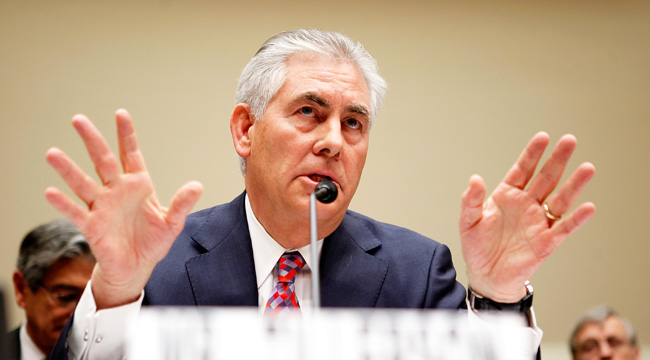
ExxonMobil CEO Rex Tillerson was something of a surprise secretary of state pick for Donald Trump, who wasn’t thrilled with existing candidates. After an offhanded mention of Tillerson, Trump agreed to a meeting and quickly began to admire his fellow business titan. Soon enough, the media dug up plenty of details on a U.S.-Russia oil firm that Tillerson directed in the Bahamas. And now, USA Today has published unearthed some relevant information regarding ExxonMobil’s practices during Tillerson’s tenure.
Tillerson, who became CEO of ExxonMobil in 2006, will be the subject of strong scrutiny at his scheduled Wednesday confirmation hearing. USA Today details how an Exxon subsidiary did business — including sales that occurred between 2003 and 2005 — with Iran, Syria, and Sudan. During the relevant period of time, all three countries were sanctioned by the U.S. for state-sponsored terrorism. Here are some of the finer details:
That business connection is likely to surface Wednesday at a confirmation hearing for ExxonMobil CEO Rex Tillerson before the Senate Foreign Relations Committee. The sales were conducted in 2003, 2004 and 2005 by Infineum, in which ExxonMobil owned a 50% share, according to SEC documents unearthed by American Bridge, a Democratic research group.
ExxonMobil told USA TODAY the transactions were legal because Infineum, a joint venture with Shell Corporation, was based in Europe and the transactions did not involve any U.S. employees. The filings, from 2006, show that the company had $53.2 million in sales to Iran, $600,000 in sales to Sudan and $1.1 million in sales to Syria during those three years.
The SEC filings mentioned above were generated after ExxonMobil’s failure to inform shareholders of sales to the three sanctioned countries. The omission raised eyebrows — although the transactions were technically legal — because the failure to disclose could have affected share value along with the company’s long-term reputation. At the time, an ExxonMobil in-house attorney, Richard Gutman, reportedly argued to the SEC that the transactions were “not material” because they paled in comparison to the company’s $371 billion in annual revenue.
However, the subject will surely arise at Wednesday’s hearing, if for no other reason than to illustrate the potential conflicts of interest accrued by Tillerson while he ran a worldwide oil conglomerate. Could get messy.
(Via USA Today)
